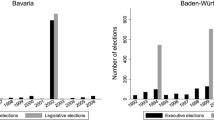Abstract
The link between business cycles and the democratic politicalsystem has long been recognized by economists. However, thedeterminants of political business cycles are not well understood.We discuss several institutional and behavioral determinants ofthose cycles, such as revolving-door appointments, term limits andpreferences of the incumbent politician, electorate and businesscommunity concerning the intertemporal pattern of publicexpenditure. We show how they affect the cycle's amplitude in thecontext of a rational-expectations model.
Similar content being viewed by others
References
Alesina, A. (1995). Elections, party structure and the economy. In J.S. Banks and E.A. Hanushek (Eds.), Modern political economy: Old topics, new directions, 145–170. New York: Cambridge University Press.
Alesina, A. and Cukierman, A. (1990). The politics of ambiguity. The Quarterly Journal of Economics 105: 829–850.
Alesina, A. and Rosenthal, H. (1995). Partisan politics, divided government, and the economy. New York: Cambridge University Press.
Baleiras, R.N. (1997). Electoral defeats and local political expenditure cycles. Economics Letters 56: 201–207.
Brennan, G. and Buchanan, J.M. (1980). The power to tax: Analytical foundations of a fiscal constitution. New York: Cambridge University Press.
Dick, A.R. and Lott, Jr., J.R. (1993). Reconciling voters' behavior with legislative term limits. Journal of Public Economics 50: 1–14.
Findlay, R. and Wilson, J.D. (1984). The political economy of Leviathan. Seminar paper no. 285. Institute for International Economic Studies, University of Stockholm.
Frey, B.S. (Ed.) (1997). Political business cycles. Cheltenham, U.K.: Edward Elgar.
Gärtner, M. (1994). Democracy, elections and macroeconomic policy: Two decades of progress. European Journal of Political Economy 10: 85–109.
Harrington Jr., J.E. (1993). The impact of reelection pressures on the fulfillment of campaign promises. Games and Economic Behavior 5: 71–97.
Keech, W.R. (1995). Economic politics: The costs of democracy. New York: Cambridge University Press.
Kraan, D.-J. (1996). Budgetary decisions: A public choice approach. Cambridge, U.K.: Cambridge University Press.
McNutt, P.A. (1996). The economics of public choice. Cambridge, U.K.: Cambridge University Press.
Nordhaus, W.D. (1989). Alternative approaches to the political business cycle. In W.C. Brainard and G.L. Perry (Eds.), Brookings papers on economic activity 2, 1–49.
Persson, T. and Tabellini, G. (1990). Macroeconomic policy, credibility and politics. Chur, Switzerland: Harwood Academic Publishers.
Reed, W.R., A retrospective voting model with heterogeneous politicians. Economics &; Politics 6: 39-58.
Rogoff, K. (1990). Equilibrium political budget cycles. The American Economic Review 80: 21–36.
Rogoff, K. and Sibert, A. (1988). Elections and macroeconomic policy cycles. The Review of Economic Studies 55: 1–16.
Shachar, R. (1993). Forgetfulness and the political cycle. Economics &; Politics 5: 15–25.
Tabellini, G. and Alesina, A. (1990). Voting on the budget deficit. The American Economic Review 80: 37–49.
Author information
Authors and Affiliations
Rights and permissions
About this article
Cite this article
Baleiras, R.N., Santos, V. Behavioral and Institutional Determinants of Political Business Cycles. Public Choice 104, 121–147 (2000). https://doi.org/10.1023/A:1005117901380
Issue Date:
DOI: https://doi.org/10.1023/A:1005117901380



